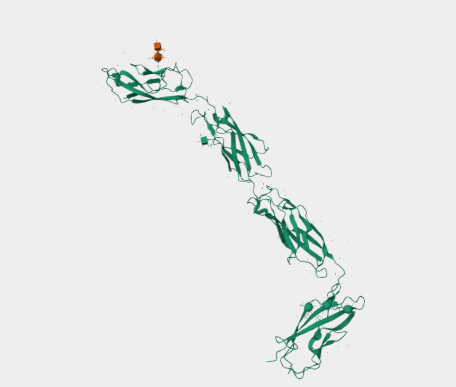Key features and details | |
Cat. No. | MABL-1374 |
Name | Anti-Desmoglein 3 mAbs |
Clone No. | AFD- AK23 |
From | Recombinant Antibody |
Isotype | Engineer antibody |
Application | IP, ELISA, IF |
Species Reactivity | Human, Mouse |
Basic Information | |
Specificity | This antibody binds mouse Dsg3 and also shows reactivity for human Dsg3. It does not show any affinity towards Dsg1. AK23 recognizes a calcium-dependent conformational epitope on Dsg3, which consisted of the V3, K7, P8, and D59 Dsg3-specific residues that formed the adhesive interface between juxtaposed Dsg. |
Alternative Name | DSG3; PVA; CDHF6; Desmoglein-3; 130 kDa pemphigus vulgaris antigen; Cadherin family member 6 |
UniProt | P32926 |
Immunogen | The original antibody was generated by immunizing Dsg3 knockout mice with recombinant mouse Dsg3-His in complete Freund's adjuvant subcutaneously. |
Application Notes | This antibody can be used to study the blister formation and complex interaction that occur in autoimmune blistering disease like Pemphigus vulgaris (PV). Pemphigus vulgaris (PV) is an epidermal blistering disorder caused by antibodies directed against the desmosomal cadherin desmoglein-3 (Dsg3). AK23 was reported to induce pemphigus vulgaris (PV) blisters in neonatal mice. The binding affinity of this antibody for human and mouse desmoglein 3 was determined using ELISA. This antibody was also used in the live keratinocyte staining of mouse PAM212 cell line and indirect immunofluorescent staining of mouse oral mucuous membrance, mouse liver and lower parts of the human epidermis. Immunoprecipitaton was used for the determination of the epitope of the antibody (PMID: 12574390). This antibody was also used in the study of alteration in desmosome morphology (PMID: 23226536). |
Antibody First Published | Tsunoda et al. Induction of pemphigus phenotype by a mouse monoclonal antibody against the amino-terminal adhesive interface of desmoglein 3. J Immunol. 2003 Feb 15;170(4):2170-8. PMID: 12574390 |
Note on publication | Describes the generation of this antibody in pemphigus vulgaris mouse model and examines its pathogenic activity in the induction of blister formation. |
COA Information (For reference only, actual COA shall prevail) | |
Size | 100 μg Purified antibody. |
Concentration | 1 mg/ml. |
Purification | Protein A affinity purified |
Buffer | PBS with 0.02% Proclin 300. |
Concentration | 1 mg/ml. |
Storage Recommendation | Store at 4⁰C for up to 3 months. For longer storage, aliquot and store at - 20⁰C. |



